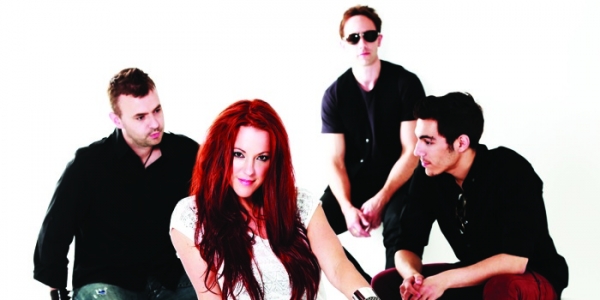“It’s hard,” he says. “I’m sitting around my apartment, not doing much, trying to get over the post-tour depression and get some rest, but I’m really bad at doing nothing. If I rest, I feel edgy.”
He plans to spend the time off seeing friends and writing songs, but if that doesn’t work, he may try an escape to the country. “I like to go out in nature,” he says. “We have a family country house an hour and a half outside of Stockholm, and I like to go there sometimes to cook and take walks. I sound like a senior citizen,” he laughs, “just walking around and cooking and being out in nature, but that’s what I do.”
The older Olenius gets, the more leisurely he becomes, and the same seems to hold true of his band. The most recent Shout Out Louds album, last year’s Optica, was a lithe and luxurious affair, and the band were happy to take as much time as they needed to get its finely wrought sound just right.
“We spent more time on this album than we ever have before,” he says. “We booked one week in the studio and did three songs, which worked really well, so we booked more and more time, until we had something like a hundred days in the studio.”
Their engineer was frequently away on tour, travelling with the likes of Lykke Li and Miike Snow, and the long breaks in-between sessions meant even more time to play. “We made guitars sound like keyboards, and the other way around,” Olenius laughs. “We tried numerous different microphone setups for vocals. We spent a lot of time working on individual sounds.”
The songs themselves are spacious, several of them featuring lengthy intro sections that build over a minute or more. The closing track, Destroy, is an example of this, building slowly but surely to a state of near-euphoria. I tell Olenius that it’s my favourite track on the album, and he seems pleased.
“Most of the songs were written quite early,” he says, “so we went back and changed a lot. With that song, we redid the drums four or five times before going back to the original one. We decided that we liked that first take the best, because it was very controlled. There are even some heavy metal-inspired drum sounds in there, on the hi-hats, which are influenced by my early, early Metallica years,” he laughs. “The long intro gives the song a very cinematic sound. It’s actually one of my favourite tracks on the record, too, and I like that it’s there at the end – it closes the album off with something very epic.”
The concept of light is central to Optica, and the band considered some aspect of it on every song. “Early on, when we were talking about this record, we decided that we wanted each song to come at you like a great wave of light,” he says. “We wanted the songs to be very light and bright – like a light at the end of a tunnel, or even a religious light. We were thinking about comets and lights in the sky – we went to the library and borrowed a whole lot of books on these subjects, and we thought a lot about how to portray them in musical terms.” He pauses. “We talked earlier about Destroy. We wanted to have a long intro because we wanted the listener to have time to really approach the song. With music, you create a world – you have to think about the little details.”
A lot of people mention specific ‘80s bands when talking about Shout Out Louds, The Cure being a popular reference point. Olenius has been hearing this comparison for a long time, and it used to annoy him, but these days, he accepts it as an amusing fact of life. “My curse is that my voice sounds a lot like Robert Smith’s!” he chuckles. “I can’t help it, that’s just the way I sing, but a lot of people make the comparison for that reason.”
While The Cure may be a sore spot, Olenius has loved ‘80s music since his teens, when a friend gave him a box set featuring such hallowed indie bands as Television Personalities, Sonic Youth and The Go-Betweens.
“Before that, I spent most of my time listening to my sister’s George Michael records,” he says. “I discovered those other acts right when we were trying to find ourselves as a band, and they sounded new and exciting to me. That, more than anything, influenced the sound of the band.”
As for the immediate future, Olenius tells me that he wants to record new material for the band as soon as possible. “We’ve noticed that it takes three years to write, record and tour an album,” he says, “and we’d like to do it faster this time. I have some songs I would like to record, and whether they will end up on an EP or a new album, I’m not sure. We have some nice songs. We might release something this year and add it on to this record, or we might start a new one. There are a lot of ideas right now. It feels comforting.”
BY ALASDAIR DUNCAN







